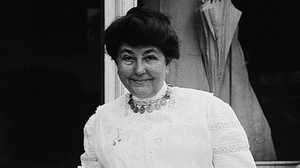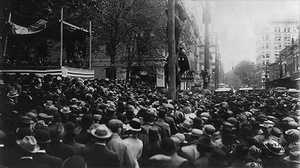Woodrow Wilson and Race in America
Woodrow Wilson's record on race relations was not very good. African Americans welcomed his election in 1912, but they were worried too. During his first term in office, the House passed a law making racial intermarriage a felony in the District of Columbia. His new Postmaster General also ordered that his Washington offices be segregated, with the Treasury and Navy soon doing the same. Suddenly, photographs were required of all applicants for federal jobs. When pressed by black leaders, Wilson replied, "The purpose of these measures was to reduce the friction. It is as far as possible from being a movement against the Negroes. I sincerely believe it to be in their interest."

As president, Wilson confronted a new generation of African American leaders, men like William Monroe Trotter, W.E.B. Du Bois and Marcus Garvey, who had begun to challenge their more conservative elders — and the expectations and assumptions of much of white America.
Du Bois was born in Great Barrington, Massachusetts in 1868, a town with few black citizens. Thus Du Bois, whose family was the only black one in the local Congregational Church, knew only muted prejudice growing up. Only when he ventured into the world as a teenager and a student at Fisk University in Tennessee did he fully encounter what he called "the whole gorgeous gamut of the American Negro." His faith shifted slowly from Christianity to a belief in the genius and cultural power of the black race. The sixth black man admitted to Harvard, he earned his degree in European philosophy and graduated with honors. He was no longer "Willie" but the fiercely proud W.E.B. Du Bois.
A personal and political antagonist to Du Bois, Garvey was both a visionary and a manipulator, a brilliant orator and a pompous autocrat. Following his 1917 emigration from Jamaica, Marcus Garvey led the largest black organization Americans had ever known. His Universal Negro Improvement Association promoted ambitious goals - racial unity, economic independence, educational achievement, and moral reform. He inspired African Americans to support his economic enterprises with their hard-earned money, established the Black Star Line shipping company, and founded the Negro Factories Corporation, which developed grocery stores, a restaurant, a laundry, a moving van fleet and a publishing house.
Born in Boston in 1872, Trotter attended Harvard and became the first black member of the Phi Beta Kappa honor fraternity. Trotter edited the militant newspaper, The Guardian, which he founded to disseminate "propaganda against discrimination." He advocated vociferously for racial and social justice, leading non-violent protests not only against plays and films such as Birth of a Nation which had glorified the Ku Klux Klan, but also against more accommodating black leaders like Booker T. Washington. Along with Du Bois and others, Trotter organized the militant Niagara movement in 1905, but as the organization evolved into the National Association for the Advancement of Colored People, Trotter would eventually drop out, accusing the group of being controlled by "white money."
When Wilson allowed his cabinet members to segregate government offices, Trotter led the delegation from the National Independent Political League to meet with the president and protest this discriminatory policy. Wilson's explanation, that "segregation was caused by friction between the colored and white clerks, and not done to injure or humiliate the colored clerks, but to avoid friction," infuriated Trotter. After the shouting match that followed, Trotter was ordered out of the White House. Trotter then did what Wilson considered unforgivable. Standing on the White House grounds, he held a press conference and detailed what had just happened. A Wilson supporter in 1912, Du Bois now sided with Trotter. In Du Bois' view, Wilson "was by birth . . . unfitted for largesse of view or depth of feeling about racial injustice."
Du Bois supported America's entry into war as one more way for black Americans to gain equality and to advance political reform both at home and abroad. It was largely wishful thinking. When black workers began appearing in the great war factories in the North, white resentment intensified, leading to race riots in cities like St. Louis. A rampage by black troops near Houston over the arrest of one of their members coming to the aid of a black woman left seventeen whites dead. Nineteen of the soldiers were convicted and executed without any chance to appeal.
In 1919, as the peace talks in Paris began, Du Bois reached Europe as part of the American press delegation. But Trotter, denied a passport by Wilson's State Department, had to obtain a job on a trans-Atlantic steamer as a cook in order to get there. He appeared at the conference as a delegate from two groups pressing for more racial justice in the postwar world. Du Bois quietly pressured the French to mount a three-day Pan African Conference, with its findings presented to the president's inner circle. He also met with Wilson's advisor Colonel House on the matter, but, predictably, nothing came of it.
Du Bois, Trotter, and Garvey continued their efforts in the fight for civil rights long after Wilson was gone. Marcus Garvey was permanently deported from the U.S. in 1927 after a vicious campaign by the federal government and other black leaders to discredit him. Yet Garvey's legacy extended directly to later civil rights activists, like Malcolm X, whose parents had been Garveyites. By the time of his death in 1934, Trotter had become increasingly marginalized because of his strident unwillingness to work with established groups, but his use of nonviolent protest was adopted in the Civil Rights Movement of the 1950s and '60s. Du Bois lived long enough to become increasingly radicalized, both embracing Communism and leaving America for Ghana in 1959. He died there four years later at the age of 95.







